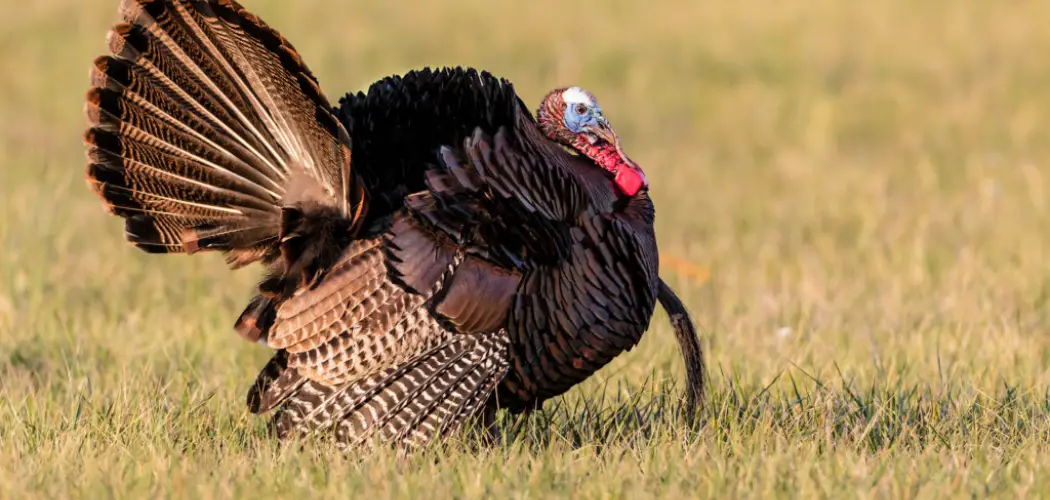The once predominantly rural wild turkeys have now become an increasingly common sight in urban and suburban neighborhoods. As their population flourishes, many residents face the challenges of property damage, safety concerns, and unsightly messes.
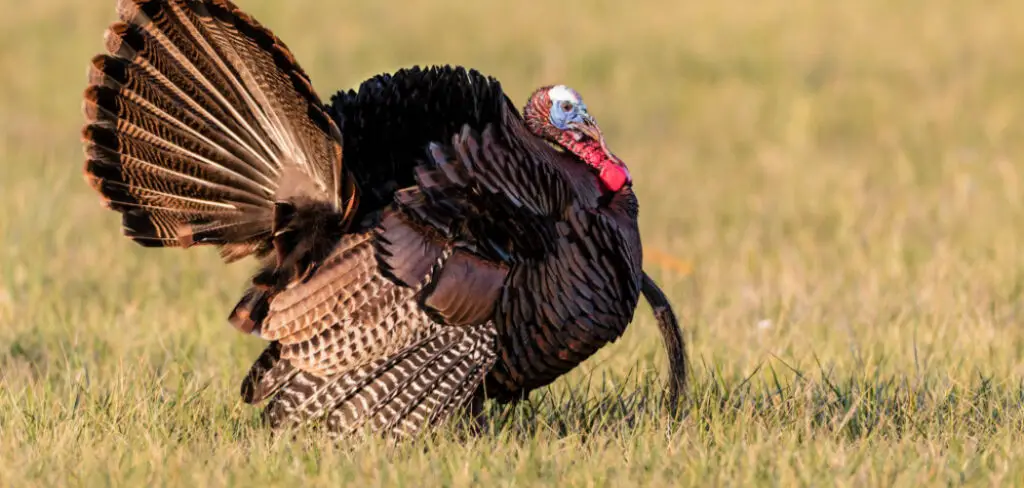
This article offers an in-depth exploration of effective and compassionate approaches on how to get rid of wild turkeys in your yard. From humane harassment techniques to legal considerations and specific behavior concerns, we will delve into various methods designed for immediate relief and focused on fostering long-term, peaceful coexistence with our feathered visitors.
Understanding Wild Turkeys and Their Behavior
Wild turkeys are inherently social creatures, often found roving in groups, which ecologists call “rafter.” Typically, these flocks are led by a dominant male, known as the tom, who guides the flock through various seasonal activities.
Being omnivorous, these birds have a diverse palate, seeking out a bevy of food sources ranging from berries and seeds to insects and, when available, human-provided scraps. This opportunistic diet has significantly influenced their adaptation to suburban environments.
Territorial by nature, wild turkeys may exhibit aggressive behavior, particularly during the breeding season in spring. Now, males can become more assertive as they compete for mates and establish dominance. Understanding this behavior is crucial for homeowners who wish to implement strategies to deter turkeys effectively without causing harm, maintaining safety for both humans and turkeys alike.
How to Get Rid of Wild Turkeys in Your Yard – Humane and Effective Strategies
1. Preventing Turkeys from Entering Your Yard
Effectively keeping wild turkeys at bay begins with proactive prevention. Rather than reacting to their presence, preventing turkeys from entering your yard can spare you the hassle of removal methods. Here are several steps you can take to make your property less appealing to these birds:
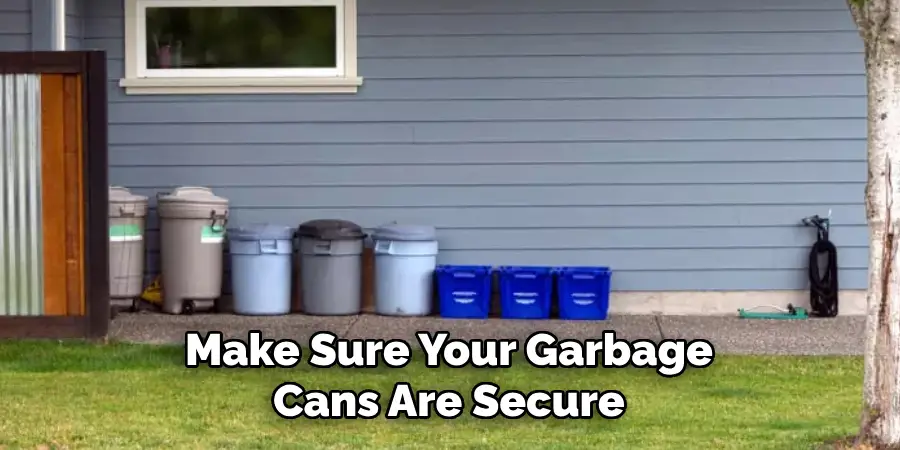
- Eliminate Attractants: Make sure your garbage cans are secure and impenetrable to curious turkeys. Compost bins should be well-maintained or enclosed to prevent them from becoming a food source. Similarly, outdoor pet food should be kept indoors or in a sealed container to avoid attracting these foragers. If you have bird feeders, clear the spilled seeds regularly or invest in squirrel-proof feeders that are less likely to dispense food on the ground.
- Make Your Yard Less Inviting: Regularly pick up any fallen fruit from trees or bushes, rake up spilled seeds, nuts, or berries, and cover your vegetable gardens with bird-proof netting. Removing these food sources can greatly reduce the likelihood of turkeys visiting your yard for a meal.
- Use Visual Deterrents: Avian psychology can be leveraged by hanging reflective materials like Mylar balloons or CDs that move in the wind and create intermittent light flashes. Predator decoys, such as coyote or hawk silhouettes, and holographic ‘scare’ owls can also unsettle turkeys, causing them to avoid the area.
- Create Physical Barriers: Installing a robust fence at least 6 feet tall is a deterrent; though turkeys can fly, it’s a less preferred method of movement. As an alternative to fences or in addition to fences, consider planting dense hedges or thorny bushes around the perimeter to create a natural, impassable boundary.
Implementing these measures can discourage turkeys from treating your yard as their habitat, thereby protecting your space while cohabiting with local wildlife.
2. Humane Harassment Techniques
When encouraging wild turkeys to scrape out a living elsewhere without causing them harm, we can rely on humane harassment techniques that distress the birds just enough to make your yard less inviting.
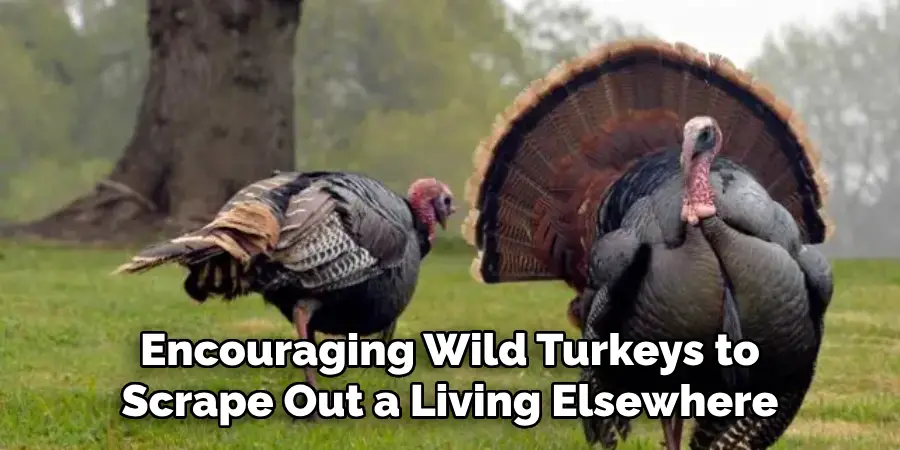
Start with making loud noises; a firm clap of your hands, an impromptu cymbal performance with your pots and pans, or even the occasional blast from an air horn can be effective. Remember to employ these techniques intermittently—constant noise may become background sound to these adaptable creatures.
Another approach is strategically using water. A burst from a hose or a sudden sprinkle from motion-activated sprinklers can startle turkeys without harm.
Aim at the ground near the turkeys foraging to encourage them to move on, not directly at the birds, to avoid causing stress or injury.
You can also physically demonstrate your dominance by moving towards them slowly while waving your arms to appear larger and more threatening; however, it’s important to avoid chasing them as this can cause undue stress and potential harm.
For more hands-off methods, consider installing motion-activated deterrents around your property. Ultrasonic devices emit sound frequencies uncomfortable to birds but typically inaudible to humans.
At the same time, select flashing lights designed to alarm wildlife, using light frequencies that are not harmful to the animals but encourage them to seek calmer surroundings. These devices can provide a continuous yet harmless reminder that your yard is not an ideal habitat for turkeys.
3. Seeking Professional Help for Persistent Turkeys
When the forays of wild turkeys become more than an occasional nuisance—transgressing into incessant visits despite the implementation of deterrent methods—it may be time to consider enlisting professional assistance. Seeking out wildlife removal specialists experienced in the humane handling of turkeys is a prudent step to take.
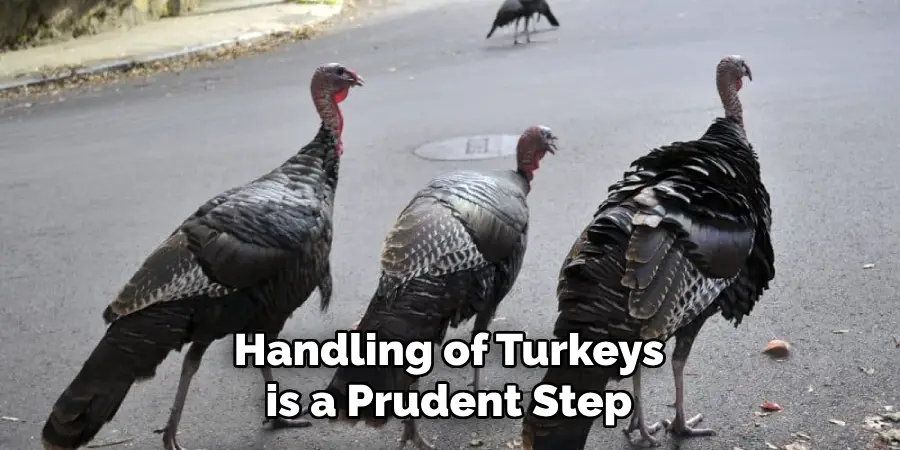
These professionals have the expertise to safely trap and relocate the birds to suitable habitats far from residential areas. Their approach is typically multifaceted, employing techniques that have minimal impact on the turkey’s well-being while effectively addressing the concerns of homeowners.
It is paramount to ensure that these experts are duly licensed and adhere to ethical practices prioritizing the humane treatment of wildlife. Not only will this safeguard the turkeys’ welfare, but it will also guarantee that the relocation process complies with the relevant wildlife conservation laws, thereby protecting the interests of all parties involved.
Legal and Safety Considerations
When addressing wild turkey issues, adherence to local wildlife regulations is essential. This includes securing any necessary permits for relocation efforts. Harassment or harm towards these birds not only contravenes ethical standards but may also violate legal statutes.
In situations where turkeys pose a safety hazard or cause significant damage, it’s recommended to contact animal control or local wildlife authorities. They provide expert guidance and can manage the situation in compliance with regional laws, ensuring both human safety and animal welfare are considered.
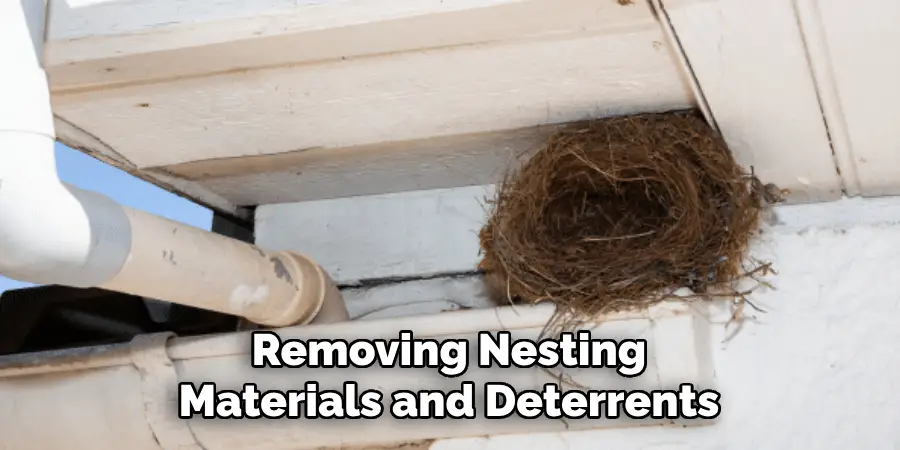
- Provide targeted advice for common issues:
- Nesting Turkeys in Your Yard: Encourage them to relocate by removing nesting materials and deterrents like sprinklers. Consider contacting wildlife professionals if nesting persists.
- Turkeys Damaging Your Property: Secure gardens with netting, cover vulnerable areas with tarps, and deter them from climbing structures with chicken wire strips.
- Turkeys Harassing Pets: Keep pets indoors or supervised and use deterrents like motion-activated sprinklers near pet areas. Avoid aggressive interactions between pets and turkeys.
- Turkeys Blocking Your Driveway or Porch: Use loud noises, sprinklers, or gentle shooing to encourage them to move. Avoid cornering or harassing them.
Addressing Specific Turkey Behaviors and Concerns
Knowing how to address specific behaviors is crucial when wild turkeys become more than just the spirit of the wilderness gracing your yard and start causing practical issues. Here are some targeted strategies to deal with common concerns:
- Nesting Turkeys in Your Yard: Dissuade turkeys from treating your lawn as a nursery by meticulously removing any nesting materials you find. Swiftly remove leaves, twigs, and anything that could be used for nest construction. Install deterrents such as motion-activated sprinklers interrupting the serenity a turkey seeks for nesting. If these attempts fail to disrupt their habits, contact a local wildlife control service to handle the situation professionally and humanely.
- Turkeys Damaging Your Property: Protect your gardens with bird netting, creating a physical barrier that prevents turkeys from ravaging your plants. For areas that turkeys tread on or peck at, consider using tarps to cover and secure these vulnerable spots. If turkeys seem fond of climbing onto structures, discourage them by outfitting these areas with strips of chicken wire or other materials uncomfortable for their feet.
- Turkeys Harassing Pets: Ensure the safety of your pets by keeping them indoors or under close supervision. Position deterrents like motion-activated sprinklers in areas where pets frequent to ward off curious or aggressive turkeys. Always avoid any scenario that may lead to hostile encounters, as this can be distressing and potentially dangerous for both pets and turkeys.
- Turkeys Blocking Your Driveway or Porch: Employ non-threatening tactics such as creating a disturbance with loud noises or using water sprinklers to prompt them to leave your immediate area. It’s critical, however, to never corner them or approach them in a manner that could be considered harassing, as this could escalate the problem and stress the animal.
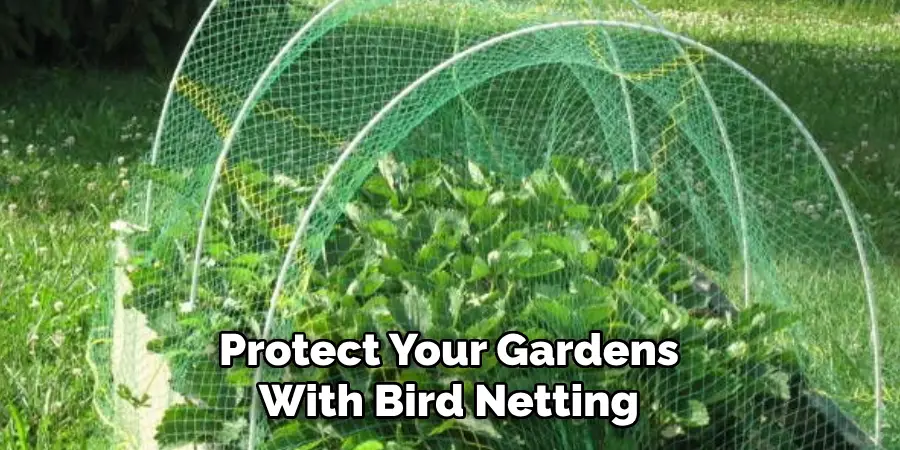
Additional Deterrent Techniques and Products
Expanding your defense against wild turkeys can include both innovative and unconventional techniques that maintain a humane touch. One such method is to apply scents of predator urine, such as those of a coyote or bobcat, around your property’s perimeter.
These products, which must be used according to the instructions, capitalize on the turkeys’ natural fear of predators to keep them at bay. Additionally, integrating specific plants into your garden can serve as natural repellents; hot peppers, marigolds, and castor beans all emit scents or contain substances that repel turkeys. However, be aware of their potential toxicity to both pets and children.
Another viable option is to invest in commercial deterrent products that offer a tech-savvy edge. Motion-activated alarms that emit realistic predator sounds can startle and dissuade turkeys from lingering in your area. Nonetheless, it is crucial to use these sparingly to prevent the turkeys from becoming accustomed to the noise, thus reducing its effectiveness.
In employing these methods, it’s imperative to prioritize the humanity of the techniques. Researching product safety and respecting wildlife while mitigating the inconveniences they may cause ensures a balanced approach to living alongside these wild neighbors.
That’s it! You’ve now learned how to get rid of wild turkeys in your yard or property while respecting and preserving their place in nature. Remember to always prioritize safety and humane treatment when dealing with these beautiful birds. By following the tips and techniques discussed, you can successfully coexist with wild turkeys without compromising anyone’s well-being.
Coexisting with Wild Turkeys: Building Tolerance
Fostering a harmonious relationship with wild turkeys begins with acknowledging their ecological significance. As natural pest controllers, turkeys play a pivotal role by devouring insects that can otherwise damage local flora. Furthermore, their foraging habits contribute to seed dispersal, assisting in maintaining plant diversity in their habitats.
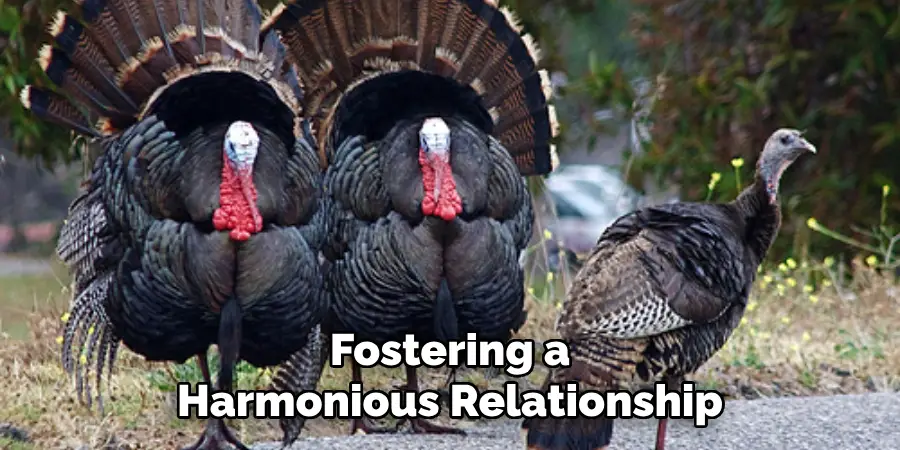
As we appreciate these contributions, observing turkeys from a safe distance can be a source of enjoyment and wonder for nature enthusiasts and families alike.
In embracing the presence of wild turkeys, consider offering them food periodically—such as cracked corn or scattered berries—outside of your yard, always adhering to local wildlife feeding regulations. This act can demonstrate respect while deterring them from treating your property as a consistent food source.
It’s worth noting that while providing such occasional treats can be a gesture of goodwill, wild turkeys’ behaviors can be unpredictable, and they should not be depended upon as a part of their diet nor encouraged to interact closely with humans.
Through understanding and mindful practice, it is possible to enjoy these majestic birds’ sights and sounds while ensuring the safety and sanctity of our shared environment.
Long-Term Strategies for Peaceful Coexistence
Successfully cohabiting with wild turkeys requires persistence and consistency in our deterrent efforts. Combining methods often yields the best outcomes, as turkeys are intelligent creatures that quickly adapt to single-strategy deterrents. Observing and adapting your strategies based on their effectiveness and the turkeys’ behavior is also advisable.
Should these efforts not lead to a resolution, or if problems escalate, don’t hesitate to seek guidance from local wildlife professionals. These experts can provide insights and assistance while ensuring that interactions remain humane and conducive to long-term coexistence with our feathered neighbors.
5 Benefits of Getting Rid of Wild Turkeys in Your Yard
While wild turkeys are a magnificent spectacle and an intriguing element of local wildlife, but their presence isn’t always cause for jubilation—especially when they treat your yard like their personal playground. The novelty can quickly wear thin for avid gardeners and those who enjoy a serene backyard. Here are five compelling advantages to encourage wild turkeys to roost elsewhere.
1. Protecting Your Garden
Prevention of Crop Damage
Wild turkeys may look for snacks in your vegetable garden, causing heartbreaking damage to your carefully cultivated crops. Their browsing habits are not selective, and they can efficiently decimate a season’s work quickly.
Preservation of Flowers and Plants
Aside from your veggies, ornamental plants and flowers can also fall victim to these feathered visitors. Their foraging can uproot delicate flora and hinder the aesthetic appeal of your garden. By deterring them, you ensure your floral displays remain glorious.
2. Reducing Property Damage
Prevention of Scratching and Pecking
Don’t be fooled by their relatively benign appearance; wild turkeys can scratch and peck at various surfaces, causing unnecessary wear and tear.
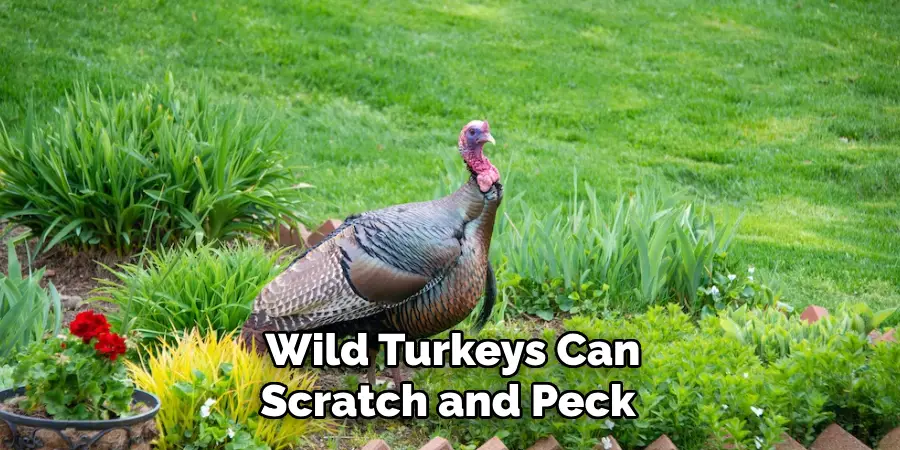
Preservation of Outdoor Furniture and Structures
Outdoor furniture, decks, and even siding can suffer from turkey-related damage. They may peck at wood and other materials, leaving artifacts that can be difficult to repair.
3. Minimizing Health Risks
Prevention of Diseases Transmitted by Wild Turkeys
Turkeys can carry and spread diseases that might pose health risks to humans and pets. You minimize these potential health risks by gently encouraging them to find a new haven.
Reduction of Parasite Infestation
These birds can be hosts to ticks and fleas, which might transfer onto pets or even latch onto you. Keeping turkeys at bay can contribute to a decrease in pesky parasitic invasions.
4. Enhancing Safety
Prevention of Aggressive Behavior
Wild turkeys can get surprisingly confrontational during mating season. They might see their reflection in shiny objects (like your car) and engage in a tussle with the ‘other turkey’, causing a ruckus.
Reduction of Accidents and Injuries
Children, pets, and even adults may trip over turkeys, which like to forage in groups—imagine you’re carrying a tray of food, and suddenly, a wild turkey troop comes underfoot!
5. Improving Peace and Quiet
Elimination of Noise Disturbance Caused by Wild Turkeys
A group of gobbling turkeys can disrupt the peaceful ambiance you crave for your backyard sanctuary.
Restoration of Tranquility in Your Yard
When the turkeys trot off to new territories, you can again partake in the tranquility and calmness of your outdoor space without interruption.
Wild turkeys are undoubtedly essential to the ecosystem, and their presence should be valued.
However, when they begin to overstep boundaries and impede human habitats, the balance can become disrupted. By humanely managing wild turkeys and encouraging them to keep a respectful distance, you can enjoy these benefits while still appreciating these majestic creatures from afar.
Conclusion and Final Words
In conclusion, addressing the challenge of how to get rid of wild turkeys in your yard centers on understanding their behavior, using deterrents wisely, openly tolerating their presence, and correcting common misconceptions.
We emphasized specific concerns affecting daily life, introduced humane additional deterrents, and unveiled the benefits of a tolerant approach.
While debunking myths, we highlighted the importance of proper feeding and handling behaviors.
Patience, respect, and proactive measures are key to coexistence. Thank you for engaging with our guide. We invite you to share success stories or pose questions as we continue learning and applying compassionate strategies for living with wild turkeys.
You Can Check It Out to Stop Animals From Digging Holes in Yard
About
Outdoor Fixes is a distinguished figure in the world of Diy design, with a decade of expertise creating innovative and sustainable Diy solutions.
His professional focus lies in merging traditional craftsmanship with modern manufacturing techniques,
fostering designs that are both practical and environmentally conscious. As the author of diy,
outdoorfixes delves into the art and science of outdoorfixes-making, inspiring artisans and industry professionals alike.
Education RMIT University
(Melbourne, Australia) Associate Degree in Design (Outdoor Fixes) Focus on sustainable design, industry-driven projects,
and practical craftsmanship. Gained hands-on experience with traditional and digital manufacturing tools, such as CAD and CNC software.
Nottingham Trent University
(United Kingdom) Bachelor’s in outdoorfixes.com and Product Design (Honors) Specialized in product design with a focus on blending creativity with production
techniques. Participated in industry projects, working with companies like John Lewis and Vitsoe to gain real-world insights.
Publications and Impact
In diy, Outdoor Fixes his insights on indoor design processes, materials, and strategies for efficient production.
His writing bridges the gap between artisan knowledge and modern industry needs, making it a must-read for both budding designers and seasoned professionals.

